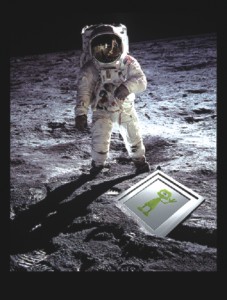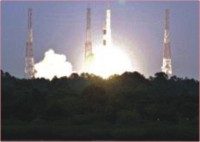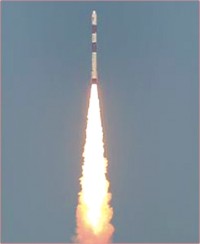 Reflections Reflections
When will Bangladesh reach the moon?
Dr Binoy Barman
India, a close neighbour of Bangladesh, in an unprecedented move has sent its first ever rocket to the moon. It is a landmark event not only for India as a nation, but for Asia as a continent. Asia is now well into the marathon of space expeditions which was a prerogative of the west. Before India, two other Asian nations -- Japan and China -- successfully floated their missions to the moon. In space race, I wonder, where is the place of Bangladesh? Can Bangladesh follow what her Asian neighbours have done? Can she burst into the space era with her own rocket at any opportune moment? These are the questions which must be asked at this juncture of history.
The unmanned rocket of India to the moon blasted off from Andhra Pradesh on 22 October 2008. The launching site, Satish Dhawan Space Centre at Sriharikota, is an island off the Bay of Bengal, very close to Bangladesh. The rocket carried a moon craft named Chandrayaan-1 equipped with many sophisticated machines to conduct scientific experiments and collect data to be analysed by the scientists here on earth. It will look for water or ice in the polar areas and prepare a three-dimensional map of the moon. It will orbit the moon for two years studying its mineral composition and searching for a new source of energy called helium-3. It will also gather information about the origins of the universe. The rocket has been built with Indian technology, in cooperation with the USA and Russia, at a cost of about 80 million dollars. It is claimed to be the cheapest rocket ever built for space work, which brings further laurels for India.
 In the history of lunar explorations, the United States first projected spacecraft with man in 1969. Neil Armstrong became the first man to walk on its surface. Since then it has sent several other manned and unmanned missions to the moon. NASA now plans a manned trip to the moon by 2020, setting up a human-staffed outpost there. Russia competed USA in moon explorations with her series of Luna missions since 1969. It was in fact Russia that initiated space research with rocket technology. It launched the world's first satellite Sputnik-1 in 1957. Its future plan includes sending cosmonauts to the moon by 2025 and building a lunar station within seven years of landing. European Space Agency, which has so far undertaken a number of lunar missions, plans to build a craft for manned flights around the moon in 2018. All these missions, if implemented, will not only increase human knowledge about the earth's only natural satellite, but also pave a way for extracting resources from there and widening opportunities for space travel. In the history of lunar explorations, the United States first projected spacecraft with man in 1969. Neil Armstrong became the first man to walk on its surface. Since then it has sent several other manned and unmanned missions to the moon. NASA now plans a manned trip to the moon by 2020, setting up a human-staffed outpost there. Russia competed USA in moon explorations with her series of Luna missions since 1969. It was in fact Russia that initiated space research with rocket technology. It launched the world's first satellite Sputnik-1 in 1957. Its future plan includes sending cosmonauts to the moon by 2025 and building a lunar station within seven years of landing. European Space Agency, which has so far undertaken a number of lunar missions, plans to build a craft for manned flights around the moon in 2018. All these missions, if implemented, will not only increase human knowledge about the earth's only natural satellite, but also pave a way for extracting resources from there and widening opportunities for space travel.
In Asia, Japan earned the honour of becoming the first space explorer. It launched its first lunar explorer Kaguya in September 2007. Following Japan, China sent a craft Chang'e-1 into lunar orbit in October 2007. Now it plans to land a rover to bring soil and rock samples in 2012. India became the third nation in Asia having the pride of reaching the moon. India plans to land a rover on the moon in 2011, ahead of China. It has also plans for sending a manned mission to space by 2014 and an astronaut to the moon by 2020.
Japan and China have also plans to send manned missions to moon in 2020. If so, the year 2020 will be another significant year for Asia. By the way one thing is clear: Japan, China and India have already emerged as space powers besides their robust economy. These three giants are most likely to lead Asia as superpowers through the twenty first century.
 'Chandrayaan' or 'Chandrajan' is a Bangla word with Sanskrit root which means 'moon vehicle'. The word has now been associated with the history of space exploration and will always give rise to a feeling of adventure and reverence in mind. It must make ecstatic the Bengali or Bangla-speaking communities around the globe. We need not feel envious of the spectacular achievement of India. Rather we should be inspired by its success and make our own attempts to overwhelm the gravitation of the globe to fly into the space on our own vessel. 'Chandrayaan' or 'Chandrajan' is a Bangla word with Sanskrit root which means 'moon vehicle'. The word has now been associated with the history of space exploration and will always give rise to a feeling of adventure and reverence in mind. It must make ecstatic the Bengali or Bangla-speaking communities around the globe. We need not feel envious of the spectacular achievement of India. Rather we should be inspired by its success and make our own attempts to overwhelm the gravitation of the globe to fly into the space on our own vessel.
The era of spacefaring knocks at the door when Bangladesh is slumbering. People of Bangladesh are not that much science-oriented, I should say. Some are even afraid of science as most of its theories are threatening for their religious beliefs. They tend to look back and never feel encouraged to take a bold step towards future with scientific and technological advancement. To them, afterlife is more important than the worldly life; illusion is truer than matter. They run after the invisible living in a visible world. Such a psychology is not conducive to scientific progress, after all.
Many people in Bangladesh still do not believe that men have set their foot on the moon. Some religious leaders rule out such facts as the propaganda of the western world. Some even go a step further. They say sky is the realm of God, so men must not disturb it. It is seen virtually as a sin to explore the sky -- trespassing on the territory of God defying divine laws. Such attitudes only hinder space exploration, drawing human minds back to stone age. They fear that space exploration will bring about disaster for the earth thanks to the curse of God.
 The scientific community of Bangladesh have also failed to come forward with any plan for space exploration. They have remained happy onlookers of others' achievements. There has been no initiative from the government either. The political parties are engaged in endless wrangling while their election manifestoes do not include agenda regarding science. When they form government after elections they become busy with making a fortune through corrupt means. Popular interest is their second concern. And science and space is no concern at all. We regrettably lack people like A P J Abdul Kalam, a scientist-turned-president, who was instrumental in the moon exploration project of India, and Madhavan Nair, Chairman of the Indian Space Research Organisation, who played a key role in rocket design. When will we get that scientific vision and political wisdom that will lift us to the height of Heavens? The scientific community of Bangladesh have also failed to come forward with any plan for space exploration. They have remained happy onlookers of others' achievements. There has been no initiative from the government either. The political parties are engaged in endless wrangling while their election manifestoes do not include agenda regarding science. When they form government after elections they become busy with making a fortune through corrupt means. Popular interest is their second concern. And science and space is no concern at all. We regrettably lack people like A P J Abdul Kalam, a scientist-turned-president, who was instrumental in the moon exploration project of India, and Madhavan Nair, Chairman of the Indian Space Research Organisation, who played a key role in rocket design. When will we get that scientific vision and political wisdom that will lift us to the height of Heavens?
Nevertheless I am not hopeless. I believe one day Bangladesh will rise up from its backwardness and accept science in their life. Its inner darkness will be illuminated with the light of the sun. People will look at the sky not with spiritual timidity but with cosmic vision and gather courage to splash into it. A space mission from Bangladesh carrying a red-green flag will hit the moon land some day. The undaunted sons of the soil will explore the solar system and fly beyond. They will explore all stars in the Milky Way and then in other galaxies. It will be a Bengali or Bangladeshi who will lead in conquering the universe. No harm in dreaming!
(The writer is Assistant Professor and Head, Department of English, Daffodil International University.)
| 